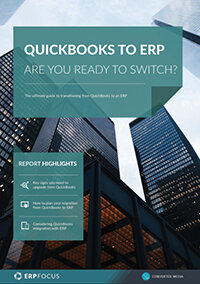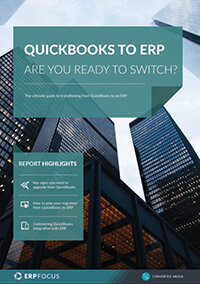This type of company should upgrade from QuickBooks to ERP
Our business began selling through the internet recently. Sales volume is great and profitability is just where we expected. Now we find we need to split sales in many ways we never did in the past to meet compliance requirements in several countries and even across states within the USA.
The data is all in QuickBooks but we find we need to use too many spreadsheets as we cannot easily get the subsets we want right from QuickBooks. A year ago, we had 25 employees, and only five needed to use QuickBooks accounting. Our staff today is almost 200 and we run up against the QuickBooks limit of 30 users way too often.
Our CPA recommends we switch from average cost inventory accounting to last-in-first-out accounting. This makes a lot of sense based on our purchasing and selling of inventory and we expect significant tax benefits but QuickBooks only supports average costing.
Not so long ago we could check on the health of the business by simply looking in the cash drawer. Over time, we now need to examine our sales backlog and recent booking trends. We used to look at inventory value and it was enough but now we need to look at the quality of our inventory within several products and locations and sometimes in aggregate too.
Our biggest customer contacts us frequently to ask about inventory levels currently and available in the near future. These calls take only a couple of minutes each and have not been a problem. Now the customer asks if we can make the data available through a portal so they can get the data in real time as they need it.
We have begun considering an initial public offering to raise capital and invest in resources that will take our company to the next level. Wall Street demands sophisticated financial reporting that our current version of QuickBooks is not likely to be able to manage.
QuickBooks is the single most popular accounting system in use today. The application began in 1983 as a single-entry accounting system for individuals known as Quicken. Today there are many versions aimed at a wide variety of businesses and available in several languages both as a desktop system and in the cloud.
With the choices of optional add-ons and third-party enhancement tools available QuickBooks is all the accounting systems many businesses need. A typical QuickBooks user manages a small or medium-sized business and is not formally trained as an accountant.
The simplicity available in this application is one of the key factors recommending it to users. QuickBooks is not an ERP system, however. ERP systems include many business functions such as inventory control, sales processing, purchasing and supply chain management, bills of material, production routing, and engineering support, all sharing common databases with accounting.
Mid-size businesses will have increasingly complex requirements that make an ERP system almost mandatory. Whether you use QuickBooks or another simple accounting system, your business can evolve or expand to a point where QuickBooks no longer meets your needs.
At this time, consider one of the second-tier ERP systems such as Epicor, Infor, Microsoft, or Sage. Start with a comprehensive list of your business requirements and find the ERP that will meet your needs today and well into the future.
Free white paper

Quickbooks to ERP: Are You Ready to Switch?
Get the definitive guide to converting your business from Quickbooks to ERP

Featured white papers
-

Quickbooks to ERP: Are You Ready to Switch?
Get the definitive guide to converting your business from Quickbooks to ERP
Download
Related articles
-

QuickBooks vs ERP: What ERP does better
Could your accounting & inventory management benefit from upgrading to ERP?
-

Secret KPI: Why Your ERP Implementation Team Matters More Than Software
Learn how Godlan ensures successful ERP implementation for manufacturers with proven strategies &...
-

Why small businesses upgrade from QuickBooks to ERP
Find out why some companies choose to upgrade from QuickBooks to ERP software

